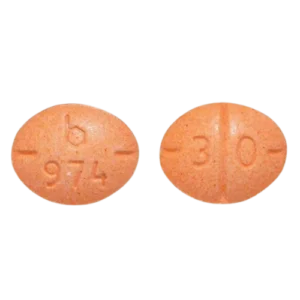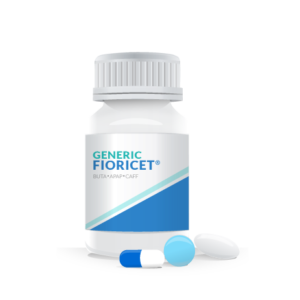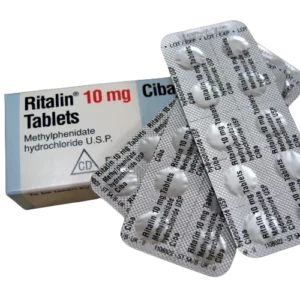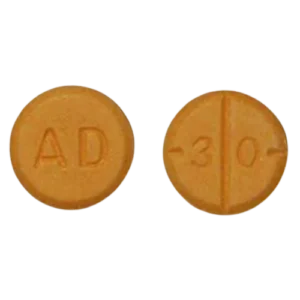Zopiclone 10mg (Imovane) Guide: Uses, Dosage, Side Effects, and Precautions for Safe Sleep:
Zopiclone 10mg, commonly known as Imovane, is a medication prescribed primarily for the short-term treatment of insomnia. Insomnia is a condition that makes it difficult to fall asleep or stay asleep, and Zopiclone is one of the drugs that helps people manage this problem. It belongs to a group of medications called sedative-hypnotics, which work by calming the brain and the nervous system. If you’re struggling to get a good night’s rest, Zopiclone may offer the relief you need.
How Zopiclone 10mg Works?
Zopiclone works by increasing the effects of a natural chemical in the brain called gamma-aminobutyric acid (GABA). GABA helps slow down brain activity, promoting a calm and relaxed state that makes it easier to fall asleep. By enhancing GABA’s effects, Zopiclone helps individuals with insomnia fall asleep more quickly and stay asleep throughout the night.
Dosage and Administration
Zopiclone 10mg is typically prescribed when a lower dose is not effective. The usual recommended dose is 7.5mg, but a healthcare provider may suggest 10mg for patients who need a stronger effect. It is important to take this medication just before bedtime, as it can make you feel very drowsy. Swallow the tablet whole with water, and avoid taking it with food, as food can delay its onset of action.
Key Reminder: Zopiclone should be taken once per day, and it is essential to follow the instructions given by your doctor or pharmacist. Taking it too frequently or in higher doses can lead to dependency and other health issues.
Common Side Effects
While Zopiclone is effective in helping people sleep, it can cause some side effects, especially during the first few days of use. These may include:
-
Drowsiness (this can last into the next day)
-
Dry mouth
-
Bitter or metallic taste
-
Headaches
-
Dizziness or lightheadedness
If you experience any of these, don’t panic. For most people, side effects are mild and wear off as your body gets used to the medication. However, if you notice any severe or persistent side effects, such as memory problems, mood changes, or confusion, seek medical advice promptly.
Serious Warnings
Zopiclone can lead to dependence, especially if used for long periods or at high doses. It is essential to follow your doctor’s advice about how long to take the medication. To avoid withdrawal symptoms, your doctor may gradually reduce your dose if you’ve been using Zopiclone for a long time.
Key Precaution: Zopiclone should not be combined with alcohol or other sedatives. Doing so can significantly increase the risk of dangerous side effects, including breathing problems or even coma. Always talk to your doctor before using any other medications while taking Zopiclone.
What to Avoid While Using Zopiclone
Here are some essential tips to keep in mind when taking Zopiclone:
-
Avoid alcohol – Alcohol can make the effects of Zopiclone stronger, leading to excessive sedation and other harmful effects.
-
Be cautious with driving or operating machinery – Zopiclone can impair coordination and alertness, so it’s important not to engage in activities that require full attention until you know how the medication affects you.
-
Avoid long-term use – Zopiclone is intended for short-term use (typically no longer than 4 weeks). Using it longer than recommended increases the risk of developing a dependence.
Dependence and Withdrawal
While Zopiclone is highly effective for treating insomnia, there is a risk of physical and psychological dependence, particularly with prolonged use. If you’ve been taking Zopiclone for an extended period, your body may become reliant on the medication to sleep. Stopping it suddenly can cause withdrawal symptoms, such as anxiety, difficulty sleeping, and even seizures.
Tip for Safe Discontinuation: Always follow your doctor’s instructions if you need to stop taking Zopiclone. The best way to stop using it is gradually reducing the dose under medical supervision.
Drug Interactions
Zopiclone can interact with other medications, so it is crucial to inform your doctor about any other drugs you are taking, including over-the-counter medications, herbal supplements, and vitamins. Some drugs that may interact with Zopiclone include:
-
Antidepressants
-
Antihistamines
-
Painkillers (especially opioids)
-
Other sedatives
Interactions with these drugs can increase side effects or reduce Zopiclone’s effectiveness, so managing your medication under the guidance of a healthcare professional is essential.
Special Considerations for Specific Groups
For Older Adults
Older adults are often more sensitive to medications like Zopiclone. They may experience side effects like confusion, dizziness, and falls. Therefore, healthcare providers usually prescribe a lower dose to older patients. Zopiclone should be used cautiously in this age group.
During Pregnancy and Breastfeeding
Zopiclone should be avoided during pregnancy unless absolutely necessary. It can affect the developing baby. If you’re breastfeeding, the medication can pass into breast milk and may affect your baby, so it should be used with caution.
For Children and Teenagers
Zopiclone is generally not recommended for children or teenagers under the age of 18, as there are insufficient studies on its safety for this age group.
Zopiclone Overdose
In the event of a Zopiclone overdose, it is crucial to get medical help immediately. Symptoms of an overdose may include excessive drowsiness, confusion, slow or shallow breathing, and a loss of consciousness. Treatment may involve activated charcoal or other measures to help remove the drug from the system.
Alternatives to Zopiclone
Zopiclone is effective for treating short-term insomnia, but it is not the only solution. There are alternative treatments for sleep problems that might suit some individuals better, such as:
-
Cognitive Behavioral Therapy for Insomnia (CBT-I): This is a non-drug treatment that helps change behaviors and thoughts that affect sleep.
-
Melatonin supplements: These can help regulate sleep-wake cycles, especially for people with jet lag or shift work.
-
Lifestyle changes: Improving sleep hygiene by maintaining a consistent sleep schedule, reducing screen time before bed, and creating a quiet, dark sleep environment can be helpful.
Before deciding on a treatment, it’s important to discuss all available options with your healthcare provider.
Conclusion
Zopiclone 10mg (Imovane) is an effective solution for short-term insomnia, offering people much-needed rest. However, it should be used cautiously, following a doctor’s recommendations, and for the shortest time possible to avoid dependence. Always be aware of potential side effects, drug interactions, and precautions, especially if you are an older adult, pregnant, or breastfeeding. If you’re struggling with sleep, talk to your doctor about the best treatment option tailored to your needs.









 USD $
USD $
 GBP £
GBP £